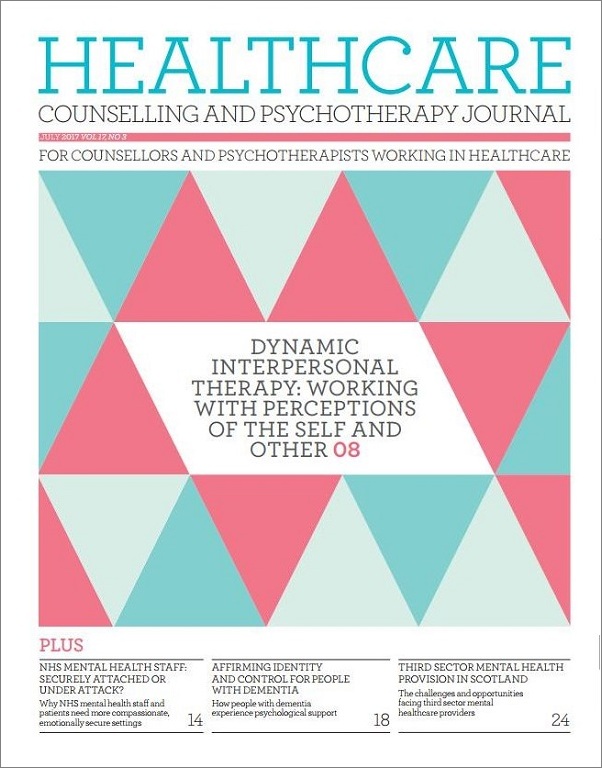In this issue
Features
Dynamic interpersonal therapy: working with perceptions of the self and others (free article)
Deborah Abrahams outlines the contribution of short-term psychodynamic work to IAPT services
NHS mental health staff: securely attached or under attack
Graham Music explores why NHS mental health staff and patients need more compassionate, emotionally secure settings
Affirming identity and control for people with dementia through person-centred approaches to support
Kelly Birtwell and Linda Dubrow-Marshall report on a study into how people with mild dementia experience psychological support
The third sector's role in designing and delivering NHS-commissioner counselling services: a Scottish perspective
Jacqui Taylor reflects on the challenges and opportunities facing third sector mental health providers in Scotland
Regulars
Chair's report - BACP Healthcare
Satinder Panesar
Healthcare update
Judy Stafford
Counselling in Primary Care
Elaine Davies
Third sector perspective
Michael Lilley
From the editor
We find ourselves in challenging times. Politically, socially and culturally we are still learning how to adapt to the changing world in which we live. For many people this can be a frightening and difficult experience, and NHS mental health services must respond by helping them to deal with the emotional and psychological challenges. Different people will require different approaches to this. As part of our series on the range of therapies offered within IAPT services, the lead article in this issue looks at dynamic interpersonal therapy (DIT), exploring the contribution of short-term psychodynamic work to NHS mental health services. We saw in the last issue that the take-up of non-CBT therapies within IAPT is very low indeed. Deborah Abrahams highlights that DIT represents less than one per cent of the overall number of referrals seen for treatment within IAPT services. It seems to me that we are missing out on the potential contribution that DIT and the other non-CBT offerings can make, alongside cognitive behavioural therapy itself.
DIT formulates depression as a threat to the patient’s attachment system. Attachment is also the theme of Graham Music’s article, which explores why NHS mental health staff and patients need more compassionate, emotionally secure settings. Graham draws parallels between the attachment experiences of early childhood and the way in which our working environment influences our ability to provide care and support to our clients. He questions whether the fast-paced, pressurised environment that characterises many IAPT services can really be conducive to our ability to provide a secure base for those who so desperately need it. The article challenges all of us to consider how we can contribute to the development of organisations that provide a secure base for staff and clients alike.
One of the biggest challenges facing NHS services today is an ageing society and the impact that this has on the provision of both physical and mental health services. According to Kelly Birtwell and Linda Dubrow-Marshall, more than 850,000 people in the UK are currently living with dementia, a number which is expected to double in the next 30 years. Kelly and Linda report on a BACP-funded study into the insights of people with mild dementia and their experiences of psychological support, skilfully highlighting their experience of loss, both of memory and of the ability to do the things that they used to do. Also emphasised is a changing sense of self, both in terms of how dementia sufferers experience themselves and how others experience them.
The researchers underline the importance of tailoring psychological support to the individual. This can only be achieved, they assert, by seeing the person first, rather than the condition. This, I think, is wise advice for all of us with our clients, no matter what their presenting issue.
The challenge of remaining client centred can be a difficult one in times when resources are scarce, and political and organisational pressures are great, as is currently the case across the UK. Jacqui Taylor reflects on the challenges currently facing third sector mental health providers in Scotland, including Brexit and a possible second referendum on Scottish independence, as well as the pressures of public sector funding cuts and austerity. While Jacqui highlights the significant impact of these external challenges, she is quick to point out that there are also new opportunities, if we are prepared to think differently, demonstrate flexibility and find new ways of working more efficiently. The lessons that Jacqui draws seem, to me, to be of relevance to third sector organisations across the whole of the UK.
The third sector perspective has been eloquently and thoughtfully represented in this journal by Michael Lilley for the past four years. We are very sorry to announce that Michael has decided to stand down from this role, as he has now retired from the counselling profession. We highly appreciate all the hard work he has put in over his time with us. While we are very sorry to lose him, we wish him all the best in his new role as a Green councillor on the Isle of Wight. We will be looking for someone to take over the third sector column from October, so if you work in a third sector counselling organisation and would like to contribute to this journal on a regular basis, then please do get in touch.
Joanna Benfield, editor hcpj.editorial@bacp.co.uk

